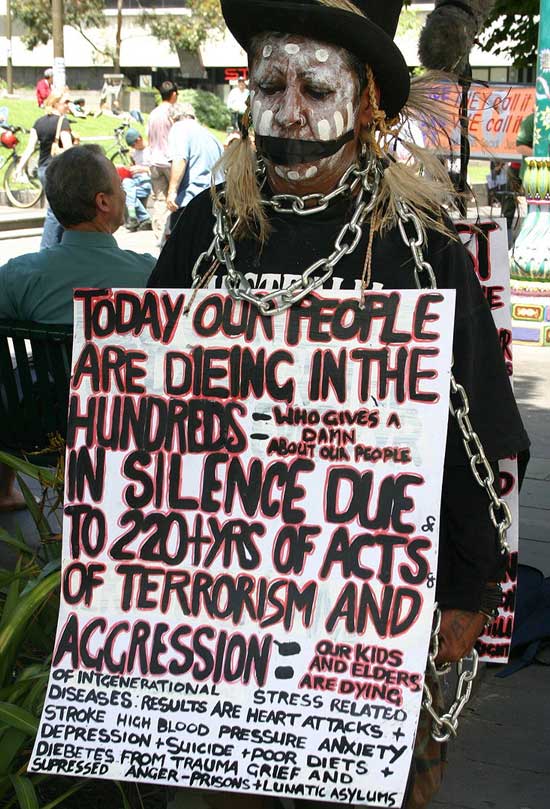It’s eight hours by car from Melbourne to Canberra, but for Susan Rankin the route will take a whole lot longer to traverse.
Rankin is one of seven women planning on taking part in what has been labelled the First Nations Women of Australia Ceremonial Walk for Freedom, a 636 km journey by foot from Victoria’s capital to the nation’s parliament.
On arriving at the heart of the Federal Government, Rankin plans to perform a dramatic act of protest and defiance – she wants to renounce her Australian citizenship.
Rankin and some of the other women involved in the march intend to hand Attorney-General George Brandis a declaration denouncing their citizenship and then hand back birth certificates, driver’s licences, and other documents tying them to Australia’s system of governance and laws.
The Dja Dja Wurrung woman told New Matilda she wants to break entirely from that system.
“Us women, we are suffering because we’re seeing the hopelessness and suffering among our people,” Rankin says.
“We see them standing and worshiping this thing called money, that is the chains around our necks today, keeping us dependent and reliant upon this system,” Rankin said.
She pointed to startling rates of youth suicide and homelessness among First Nations peoples as well and disconnection from traditional land as some of the reasons for wanting to remove herself from Australian law.
“We were born free and equal in Creator Spirit’s eyes and there is nothing free or equal about a class system we are living in today, and it is the cause of our people’s pain and suffering.
“We are a spiritual people, we can not be bound by two laws.”
Rankin currently receives the Disability Support Pension, but says she will disavow it and all other forms of government support once she hands her papers in.
“We will get nothing, we’re won’t be eligible for Centrelink payments, or Medicare or public housing or none of that.
“We become like nomads in our own land,” she said.

While the act of defiance will have real and symbolic implications for the 57-year-old woman, it is unlikely to be formally recognised by the system Rankin is trying to depart from.
Professor Kim Rubenstein, director of ANU’s Centre for International and Public Law, told New Matilda it would not be possible for Rankin and those travelling with her to simply give up their citizenship as a matter of law.
“You can't lose your citizenship if you don't have another one," Rubenstein says.
"If those Aboriginal women do not hold another citizenship they can not renounce it unilaterally.
"The minister must approve a renunciation and the Minister as a matter of law can't approve the renunciation if they don't hold another citizenship because that would make them stateless and Australia is a signatory to the Convention Against Statelessness."
But Rankin is determined to press ahead regardless of whether her move is acknowledged by the government or not.
“They should be glad to see the back of us, we just want to go out and sit on the land like the old people, Vincent Lingiari and that,” she said.
The group of women walking with Rankin will be assisted by supporters in cars, driving ahead to set up campsites, provide security, and help with cooking and other daily tasks.
After a fundraising campaign the First Nations Women of Australia Ceremonial Walk for Freedom have had their costs covered by an anonymous donor.
Rankin is proposing that after the walk the women set up a dry camp, and offer it as a place of healing for other First Nations peoples.
Before any confrontations in Canberra or sitting on country, however, there’s a lot of walking to be done. Though nervous, Ranking is upbeat about what the project’s outcome will be.
“It’s hard to predict – from little things big things grow,” she said.
Donate To New Matilda
New Matilda is a small, independent media outlet. We survive through reader contributions, and never losing a lawsuit. If you got something from this article, giving something back helps us to continue speaking truth to power. Every little bit counts.



